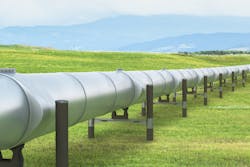The oil and gas industry has criticized President Obama’s decision to reject the Keystone XL oil pipeline.
The president said on Friday that, after extensive analysis, the State Department had concluded that the pipeline would not serve the national interest of the United States. “I agree with that decision,” he added.
TransCanada first sought a presidential permit for Keystone XL seven years ago. The proposed 1,179-mile pipeline was planned to carry 800,000 barrels a day of crude oil from the Canadian oil sands to the Gulf Coast.
Responding to the decision on Friday, the Canadian energy company said that it was “disappointed” and was considering all options, including filing a new application for a presidential permit.
“Numerous independent studies have consistently concluded that the safest way to transport oil is in a modern, safe pipeline,” said the company’s president and CEO Russ Girling. “Keystone XL would help replace the higher risk trucks, trains, barges and tankers currently carrying oil to market, and would provide the U.S. with energy supply security by connecting U.S. and Canadian producers to American refineries with a pipeline running four feet under the ground.
“TransCanada is reviewing the decision and its rationale. We believe KXL is in the best interest of the United States and Canada.”
Meanwhile, the American Petroleum Institute (API) issued a strongly worded statement, claiming that the president’s rejection of Keystone XL was a political decision and “an assault against American workers”.
“It’s ironic that the administration would strike a deal to allow Iranian crude onto the global market while refusing to give our closest ally, Canada, access to U.S. refineries,” said API president and CEO Jack Gerard.
Trade association AFPM, which represents U.S. fuel and petrochemical manufacturers, highlighted the State Department’s “long-standing recognition that the pipeline would have no impact on the environment” and said that the decision was a “purely political move.”
Reflecting on the future for Canadian oil, the Canadian Association of Petroleum Producers (CAPP) said that exporters will “find new paths” to markets.
“Canada has what the world needs — a reliable supply of energy that is produced safely and responsibly,” said CAPP president and CEO Tim McMillan. “Canadians will find a way to meet the demands of these global markets.”
